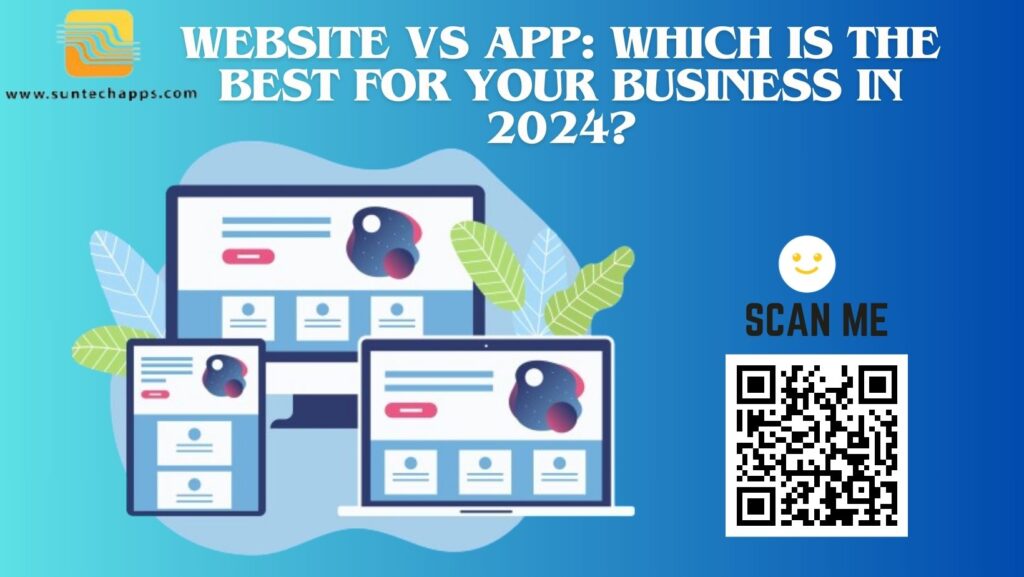Website vs App: Which is the Best for Your Business in 2024?
4 min read
In today’s fast-paced digital world, having a solid online presence is like having a storefront on the busiest street in town. But with all the options out there – websites, mobile apps, or maybe even both – how do you know which one is right for your business? It’s a question that many entrepreneurs grapple with as they navigate the ever-changing landscape of technology. That’s where this guide comes in. We’re going to break down the ins and outs of websites and apps, weighing up their pros and cons so you can make an informed decision for your business in 2024.
Understanding the Fundamentals: Websites vs. Apps
Websites: Accessed through web browsers, websites are essentially digital brochures offering information about your business, products, or services. They are accessible across various devices, including desktops, laptops, tablets, and smartphones. Think of them as your digital calling card. They’re like the shop window where potential customers can peek inside and see what you have to offer. Whether they’re browsing on their laptop, tablet, or smartphone, a website ensures that your business is accessible to anyone with an internet connection. It’s your chance to showcase your products, services, and brand personality to the world.
Mobile Apps: Downloaded and installed on smartphones or tablets, apps offer a more interactive and personalized experience. They can leverage device features like GPS, camera, and push notifications to provide unique functionalities. Mobile apps offer a more immersive and personalized experience. They’re like having a loyal customer carrying your business around in their pocket. With features like push notifications, GPS integration, and in-app purchases, apps can engage users in ways that websites simply can’t. They’re perfect for businesses looking to build deeper relationships with their customers and offer a seamless shopping experience on the go.
Key Considerations for Choosing the Right Platform
-
Target Audience and User Behavior:

Understanding your target audience and their online behavior is paramount. Consider:
Demographics: Are your customers primarily young, tech-savvy individuals or an older generation less comfortable with technology?
Access Points: Do they primarily use smartphones, or do they prefer desktops/laptops?
Desired Functionality: What features and functionalities are most important to your target audience?
-
Business Goals and Objectives:
What are your primary goals for your online presence?
Brand Awareness: If your focus is on building brand awareness and reaching a wider audience, a website is a cost-effective solution.
Customer Engagement: If you want to foster deeper customer engagement and loyalty, an app with interactive features and personalized content might be more effective.
Sales and Conversions: Both websites and apps can be optimized for sales, but apps can offer a more streamlined and convenient shopping experience for mobile users.
-
Budget and Development Resources:
Developing and maintaining an app typically requires a higher budget and more technical expertise compared to a website. Consider your financial resources and access to development talent before making a decision. Will you opt for iPhone app development in USA, Android app development in USA, or perhaps both? Assessing your resources is fundamental to making an informed decision.
Advantages and Disadvantages: Weighing the Options
Websites:
Pros:
Wider Reach: Accessible across all devices with internet access.
Cost-Effective: Generally cheaper to develop and maintain than apps.
SEO Benefits: Easier to optimize for search engines, increasing visibility.
Flexibility: Easier to update and modify content.
Cons:
Limited Functionality: May not offer the same level of interactivity and advanced features as apps.
Reliance on Internet Connectivity: Requires a stable internet connection to function properly.
Less Personalized Experience: May not offer the same level of personalization as apps.
Mobile Apps:
Pros:
Enhanced User Engagement: Interactive features and personalized content can increase engagement.
Offline Functionality: Some apps can offer limited functionality even without internet connectivity.
Push Notifications: Can be used to send timely updates and promotional offers.
Leveraging Device Features: Can integrate with device features like GPS, camera, and sensors for unique functionalities.
Cons:
Higher Development Cost: Requires more resources and technical expertise to develop and maintain.
Limited Reach: Only accessible on specific platforms (Android, iOS)
 .
.
App Store Approval Process: Can be time-consuming and complex.
Potential for Uninstall: Users may uninstall the app if they don’t find it valuable.
Finding the Perfect Blend: A Hybrid Approach
For many businesses, the optimal solution may lie in a hybrid approach, combining the strengths of both websites and apps. This could involve:
Developing a responsive website: Optimized for all devices, ensuring a seamless user experience across desktops, mobiles, and tablets.
Creating a web app: Offers app-like functionality within a web browser, eliminating the need for separate app downloads.
Developing a targeted app: Focusing on specific functionalities and features most relevant to your target audience.
Conclusion: The Right Choice for Your Business
Ultimately, the decision of whether to invest in a website, an app, or both depends on your specific business needs, target audience, and budget. By carefully considering the factors outlined above, you can make an informed decision that will help you achieve your online goals and propel your business forward in 2024 and beyond. Whether you opt for iPhone app development in USA, Android app development in USA, or PHP web development services, the key is to adopt a strategic approach that aligns with your objectives and resonates with your audience.
Remember, there is no one-size-fits-all solution. The key is to adopt a strategic approach that aligns with your unique business objectives and caters to the needs and preferences of your target audience.




